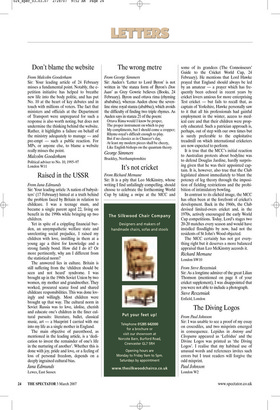It’s not cricket
From Richard Mernane
Sir: It is a pity that Leo McKinstry, whose writing I find unfailingly compelling, should choose to celebrate the forthcoming World Cup by taking a swipe at the MCC and some of its grandees (The Connoisseurs’ Guide to the Cricket World Cup, 24 February). He mentions that Lord Hawke prayed that England should always be led by an amateur — a prayer which has frequently been echoed in recent years by cricket lovers anxious for more enterprising Test cricket — but fails to recall that, as captain of Yorkshire, Hawke personally saw to it that all his professionals had gainful employment in the winter, access to medical care and that their children were properly educated. Such a patrician approach is, perhaps, out of step with our own times but is surely preferable to the exploitative treadmill on which international cricketers are now expected to perform.
It is true that the MCC’s initial reaction to Australian protests about bodyline was to defend Douglas Jardine, hardly surprising given that he was their appointed captain. It is, however, also true that the Club legislated almost immediately to blunt the potency of leg theory through the imposition of fielding restrictions and the prohibition of intimidatory bowling.
In contrast to its clichéd image, the MCC has often been at the forefront of cricket’s development. Back in the 1960s, the Club devised limited-overs cricket and, in the 1970s, actively encouraged the early World Cup competitions. Today, Lord’s stages two 20-20 matches every season and would have installed floodlights by now, had not the residents of St John’s Wood objected.
The MCC certainly has not got everything right but it deserves a more balanced appraisal than Leo McKinstry accords it.
Richard Mernane London SW10










































































 Previous page
Previous page